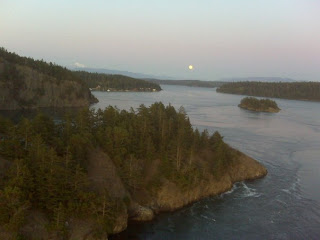

Fly fishing is often exalted as a sport that requires a deeper understanding of nature, given that the mimicking of hatches and the reading of water and the like necessitates a fuller engagement of ecosystems in action. Or something of the sort. Whatever else it may be, fishing is a reminder that nature is not always a benevolent aide to human endeavors.
On a recent outing, we were fishing off the southern part of Indian Island. The sky was a clean, wind-swept blue; the Olympics jutted above the trees to the west, and the snow-tipped Cascades rose off to the east. It was easily one of the more beautiful places I’ve ever visited. It was also extremely windy. Kansas-style windy. So windy that it was impossible for me to mend my line, let alone to make decent casts. Once we gave up on fishing, we puttered around Port Townsend, then just made the 5:10 ferry, lucking out as stand-by passengers. As we drove across Whidbey Island, we discussed writing projects and the books we were reading; we talked about dogs and wilderness and factory farming. We got to Deception Pass, the connecting point between Whidbey and Fidalgo Islands, just as the sun was setting over the Strait of Juan de Fuca. Ever since our early road-tripping days, back when we were driving Highway 1 up the California coast, we’ve been waiting for the perfect Pacific sunset. Clouds and mountains and trees had always foiled our plans, but this was magnificent. The sky was streaked with orange and purple, the green-blue, white-foamed water dominated the foreground, and trees shaded into distant bluish mountains. As if to gild the lily, we turned and saw a full moon rising over the Cascades in the east. The whole scene had the feel of a minor miracle. People were jumping out of their cars, skipping along the bridge to snap pictures they knew would compete poorly with the experience of being there. Perfect strangers grinned at each other awkwardly, giddy and a little embarrassed at having shared something that felt so special and almost intimate. The afternoon had doted upon us with a series of happy coincidences.
When we got home, though, the same winds that had complicated our fishing had also blown down trees and knocked out power to our neighborhood. Of course I’d waited until Sunday evening to finish my lesson plans, and we were sitting at a road block a half a mile away from our non-electrified house. The serenity of the sunset ebbed completely, and I was tired, cranky, and behind for the week, and there was absolutely nothing I could do.
Deception Pass is but one part of the system of rugged inlets, islands, and coves that characterize the Washington coast; it is so named because the Vancouver Expedition explorers who traversed it thought it a part of the mainland. Whether cartographic or ecological, nature does have lessons for us--object lessons about preparedness, and more abstract lessons about respecting complexity--but conservation is one thing, and empathetic fallacy entirely another. It is good for the human spirit to seek solace in nature and to delight in mountains and seascapes, but sustainability is ultimately a human concern. We talk of saving the earth, when what we really mean is the hope of preserving our ability to survive on the planet. Nature--that is, the forces behind sunsets and photosynthesis and air currents--ultimately doesn’t care whether we survive or not, or in what condition. Although we should certainly care about creatures beyond ourselves, talk about climate change and environmentalism often seems shot through with the same anthropocentrism that got us into this mess. The earth is simply too vast and too interconnected; we can no more save it than we can have dominion over it.

No comments:
Post a Comment